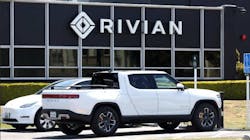Rivian Retools Illinois Plant, Aims for Profit by Year-end
Rivian Automotive leaders’ sights are set on one goal: Saving money. In a quarter that saw the electric truck maker slash 10% of its workforce and improve its net-loss-per-vehicle by 12%, the company seems well on its way to achieving that.
Two big pillars in Rivian’s cost-cutting plans have already been completed: Pausing construction of its $5 billion factory in Georgia and retooling its existing plant in Normal, Illinois. Executives announced the former earlier this year, alongside news that it would have its third round of layoffs since July 2022.
Originally, the Georgia site was to be the home of Rivian’s upcoming R2, which is still on track to begin production during the first half of 2026. Instead, it will now be produced at its existing plant, which is projected to save the company over $2 billion between now and the start of production. While construction is indefinitely paused, plans for the plant have not been canceled.
The retooling, which had been planned for some time, resulted in a weeks-long shutdown during April. While the financial effects of the shutdown will be seen in future quarters, executives seemed pleased with the results: New technology and material changes for the R1 platform and an increased R1 line rate by “roughly 30%” according to CEO RJ Scaringe. The upgrade will also allow the facility to produce 215,000 vehicles per year, 155,000 of which are expected to be R2 units.
Rivian produced 13,980 vehicles in Q1 and delivered 13,588. The delivery numbers were above executives’ projections and CFO Claire McDonough said they expect it to grow by “low-single digits” compared to 2023. She also reiterated the 57,000-unit production guidance they announced earlier this year.
Financially, the company was hit or miss: Net loss per vehicle fell roughly 12% quarter over quarter to approximately $38,800, which included the one-time expenses associated with the plant upgrades.
Rivian generated $1.2 billion in revenue, nearly doubling it year over year, but a 9% drop compared to last quarter. Operating expenses were also up compared to Q1 2023, coming in at $957 million compared to $898 million, and it had a gross loss of $527 million, an improvement from the corresponding period.
Looking forward, Rivian reduced its capital expenditures projection by $550 million, down to $1.2 billion, largely because of the move of R2 to Illinois. Executives are also targeting a positive gross profit by the fourth quarter, following what McDonough said would be “meaningful improvement” in gross profit in the second half of 2024. She also spoke in more detail about the path they were on.
“The largest driver for us in our path to positive gross profit remains the improvement in variable cost reduction,” she said. “In Q1, we saw material cost improvements for each of our vehicles and we expect to see a step change in our R1 material costs, driven by the introduction of engineering driven design changes [and] cost focused material changes that we've already negotiated with suppliers.”
She also added that the tooling upgrades, which reduced the per unit labor and overhead costs, and a decline in depreciation expenses associated with the original tooling, would be significant factors. Past that, she and the others plan an increase in revenue due to “increased sales of regulatory credits, software and services revenue as well as remarketing sales.”
“We have a detailed roadmap that we're executing against and continue to feel confident in our plan and our path to achieve positive gross profit in Q4 of this year,” she said.
Shares of Rivian (Ticker: RIVN) have trended downward in the past six months, hitting an all-time low of $8.26 per share in April. Rivian reported results after the bell, closing at $10.25 per share and opening at $9.50 the next day. As of writing, the price sits at $9.85 per share and its market capitalization is $9.8 billion.
